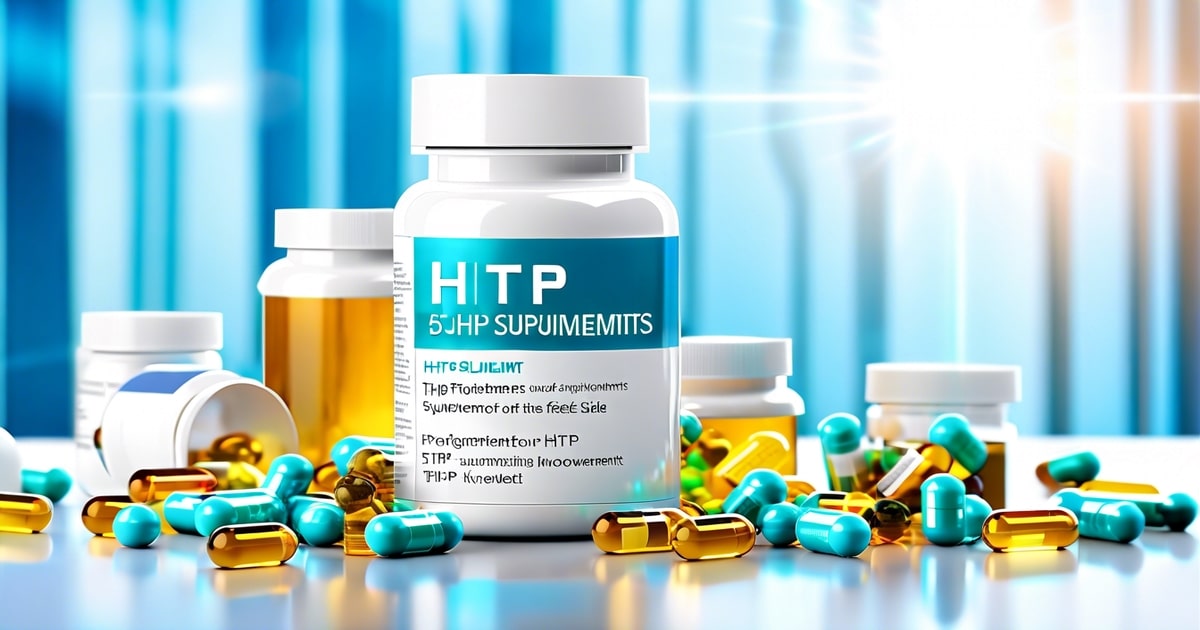Key Takeaways
- Be Informed: Before starting supplementation, understand the potential 5 HTP side effects and interactions of 5-HTP, tryptophan supplements, and serotonergic drugs.
- Consult a Healthcare Professional: Seek advice from a healthcare provider, especially if taking medications, tryptoph
- an supplements, or serotonergic drugs, to ensure 5-HTP is safe for you.
- Monitor for Symptoms: Stay vigilant for adverse reactions, serious side effects, excess serotonin, or unusual symptoms while using 5-HTP, and seek medical attention if necessary.
- Special Consideration for Certain Groups: Pregnant or breastfeeding women and individuals with specific health conditions or patients should exercise caution and consult with a healthcare provider before using 5-HTP.
- Avoid Overdose: Adhere to recommended dosages and avoid exceeding the recommended intake of 5-HTP, a health supplement, to prevent potential risks and complications.
- Be aware of rare but serious conditions like serotonin syndrome associated with 5-HTP usage.
Considering adding 5HTP to your wellness routine? Hold up! Before diving in, patients must understand the potential side effects. From digestive issues to serotonin syndrome, there’s a range of possible outcomes when patients using hydroxytryptophan supplement. We’ll explore the ins and outs of 5HTP side effects, shedding light on what patients should know before incorporating hydroxytryptophan into their treatment regimen.
Understanding the Effectiveness of 5-HTP
Efficacy and Safety

Research into the efficacy of 5-HTP has shown promising results in supporting mood regulation, depression treatment, and sleep quality. However, it’s essential to note that, like any supplement or medication, there are potential side effects to consider. While some people may benefit from its treatment, others might experience adverse reactions.
Studies have suggested that 5-HTP could be ineffective for certain individuals or cause unwanted effects such as gastrointestinal issues, dizziness, and ineffective interactions with other medications. It’s crucial for anyone considering 5-HTP supplementation to consult a healthcare professional before use.
Blind Study Findings
In a blind study conducted on the side effects of 5-HTP, participants reported experiencing mild adverse reactions such as nausea and heartburn. These findings emphasize the importance of being aware of potential side effects when using this supplement.
It’s important to approach any new supplement cautiously, understanding that individual responses can vary widely. Consulting a healthcare provider will ensure personalized guidance based on one’s specific health conditions and existing medications.
Common Side Effects of 5-HTP Supplementation
Possible Side Effects

When taking 5-HTP, some individuals may experience mild side effects such as nausea or digestive discomfort. These are the most common side effects associated with 5-HTP supplementation. It’s essential to be aware of these possible side effects before starting a med regimen.
Some individuals may also encounter other common side effects, including dizziness or drowsiness when consuming 5-HTP supplements. These side effects can impact an individual’s daily routine and should be considered before beginning supplementation.
Serious Side Effects
While most people only experience mild or common side effects from 5-HTP treatment, it’s crucial to note that serious adverse reactions are rare but possible. If someone experiences symptoms like severe stomach pain, muscle spasms, or sudden mood changes after taking 5-HTP, hydroxytryptophan, they should seek medical attention immediately.
Potential Interactions with Medications and Supplements
Serotonin-Level Affecting Medications

Some medications and dietary supplements can interact with 5-HTP, especially hydroxytryptophan, which influences serotonin levels. For instance, individuals using antidepressants or other psychiatric medications should be cautious when considering 5-HTP supplementation. This is due to the potential for adverse effects or drug interactions.
It’s crucial for anyone taking such medications to seek medical advice before incorporating 5-HTP into their routine. Consulting a healthcare professional helps assess the likelihood of interactions with other drugs or supplements. This step is essential in preventing potential complications arising from combining these substances.
Importance of Medical Consultation
Seeking medical attention before starting a new supplement regimen, such as hydroxytryptophan, is vital. High doses of 5-HTP can lead to adverse effects, particularly when used alongside certain drugs or dietary prescriptions. Therefore, individuals must prioritize discussing their supplement plans, including hydroxytryptophan, with a healthcare provider.
Safety Concerns and Precautions for 5-HTP Users
Starting with Low Doses
It’s crucial to begin with low doses. This helps the body adjust gradually, reducing the likelihood of adverse reactions. Starting with 50 mg per day and increasing by 50 mg every three days is a common approach for hydroxytryptophan.
It’s essential to be patient when taking 5-HTP supplements. Rushing into high doses of hydroxytryptophan can lead to unpleasant side effects such as nausea or gastrointestinal discomfort. By slowly increasing the dosage of hydroxytryptophan, individuals give their bodies time to adapt without overwhelming their systems.
Seeking Healthcare Provider Advice
Individuals with pre-existing medical conditions should consult a healthcare provider before using 5-HTP. Conditions like heart disease, liver problems, or mental health disorders may interact negatively with this supplement. Seeking professional advice ensures that potential risks are identified and managed appropriately.
If someone is already taking medications or other supplements, it’s important to discuss the use of 5-HTP with a healthcare provider. Certain drugs and substances may interact adversely with 5-HTP and hydroxytryptophan, leading to unwanted complications. Therefore, professional guidance helps prevent any harmful interactions and promotes safe usage.
Specific Risks for Certain Populations
Pregnancy and Breastfeeding
Pregnant or breastfeeding women should avoid using 5-HTP (hydroxytryptophan) due to potential risks to the infant. The safety of 5-HTP (hydroxytryptophan) during pregnancy and breastfeeding has not been established, so women in these stages must prioritize the well-being of their child by steering clear of this supplement.
Since 5-HTP (hydroxytryptophan) may affect serotonin levels, which can impact mood regulation and other bodily functions, pregnant and breastfeeding women need to consult with a healthcare professional before considering its use.
Children and Adolescents
Children and adolescents should only use 5-HTP under the guidance of a qualified healthcare professional. Their bodies are still developing, making them more susceptible to side effects. Parents or guardians must seek medical advice before introducing supplements into their children’s regimen.
Based on each case, healthcare professionals can assess whether the benefits outweigh the risks. This cautious approach ensures that young individuals receive appropriate care tailored to their needs.
Individuals with Pre-existing Health Conditions
Individuals with liver disease or significant health concerns should approach 5-HTP use with caution. Since 5-HTP is metabolized in the liver, those with existing liver conditions may be at an increased risk of adverse effects from this supplement.
Furthermore, individuals dealing with serious medical conditions need personalized care. Consulting a healthcare provider is crucial before incorporating hydroxytryptophan into their treatment plan.
Serotonin Syndrome and 5-HTP
Understanding Serotonin Syndrome
Excessive intake of 5-HTP can lead to serotonin syndrome, a potentially serious condition. When the body has too much serotonin, it can cause a range of symptoms, such as agitation, rapid heart rate, and high blood pressure. These symptoms may escalate rapidly and become life-threatening if not addressed promptly.
Serotonin syndrome occurs when there is an excess of serotonin concentrations in the body, often due to certain medications or supplements like hydroxytryptophan that increase serotonin levels. In this case, taking 5-HTP as a supplement can result in elevated serotonin levels beyond what the body can safely regulate.
Risks Associated with 5-HTP Supplementation
For individuals considering 5-HTP supplementation, understanding the risk of serotonin syndrome and hydroxytryptophan is crucial. It’s especially important for those who are already taking serotonergic drugs or antidepressants that affect serotonin levels. Combining these medications with hydroxytryptophan (5-HTP) could further elevate serotonin concentrations in the body, leading to adverse effects.
Individuals need to view abstract and be aware of potential interactions with hydroxytryptophan and other medications. The risk factors associated with excessive serotonin production highlight the importance of consulting healthcare professionals before starting any new supplements.
Eosinophilia-myalgia Syndrome and 5-HTP Overdose
Contaminated Batches
In the past, there have been cases of eosinophilia-myalgia syndrome associated with contaminated batches of 5-HTP supplements. These incidents underscore the importance of ensuring the quality and source of 5-HTP supplements. Contamination can lead to severe health complications, so obtaining these supplements from reputable sources is crucial.
Consumers need to be aware of potential risks related to the production and distribution processes when purchasing 5-HTP supplements. For instance, a lack of stringent quality control measures in manufacturing facilities can result in substandard products reaching the market.
Recommended Dosages
Overdosing on 5-HTP, also known as hydroxytryptophan, can lead to severe health complications such as allergic reactions, muscle spasms, nausea, diarrhea, and high blood pressure. This emphasizes the importance of adhering to recommended dosages when taking 5-HTP supplements.
Consumers should always follow recommended dosage guidelines provided by healthcare professionals or product labels. Exceeding these guidelines significantly increases the risk of adverse effects associated with high doses.
Safety During Pregnancy and Breastfeeding with 5-HTP
Pregnancy Precautions
Pregnant women should avoid using this supplement. There is insufficient safety data regarding its effects on fetal development. The potential risks of impacting the baby’s growth and development make it advisable for pregnant women to steer clear of 5-HTP.
Breastfeeding Concerns Similarly, breastfeeding mothers are advised against using 5-HTP (hydroxytryptophan) due to the potential transfer of the compound to their infants through breast milk. This can lead to unforeseen side effects in babies, as there isn’t enough information available regarding how 5-HTP (hydroxytryptophan) might affect an infant’s developing system through breastfeeding.
Given these concerns, alternative approaches for mood support during pregnancy and breastfeeding, such as hydroxytryptophan, are recommended. For instance, engaging in regular exercise, seeking counseling or therapy sessions, and maintaining a healthy diet rich in essential nutrients like omega-3 fatty acids from fish oil or flaxseed oil can be beneficial alternatives without posing risks associated with 5-HTP use.
Summary
Now that you know about 5-HTP, consider its good and bad effects before using it. Talk to a doctor before trying new supplements to help you decide what’s best for you. Keep learning and reading so you can make smart choices for your health.
Remember, your health is a priority, so take the time to educate yourself and make informed decisions. If you have any concerns or questions about 5-HTP or other supplements, don’t hesitate to contact a qualified healthcare provider. Your well-being matters, and seeking professional advice ensures you’re taking the best care of yourself.
Frequently Asked Questions
Is 5-HTP effective for improving mood and sleep?
Yes, 5-HTP is believed to enhance mood and promote better sleep. It works by increasing serotonin levels in the brain, positively impacting mood and aiding in relaxation.
What are some common side effects of taking 5-HTP?
Common side effects of 5-HTP supplementation may include nausea, stomach discomfort, and dizziness. It’s essential to start with a low dose and gradually increase it to minimize these effects.
:What are the Potential Side Effects and Risks of Using 5-HTP?
When taking 5-HTP, it’s important to be aware of the potential side effects, which may include nausea, stomach pain, and diarrhea. Some individuals may also experience dizziness or drowsiness. In rare cases, there is a risk of developing serotonin syndrome, particularly when 5-HTP is taken with other medications that increase serotonin levels.
Can 5-HTP interact with other medications or supplements?
Yes, 5-HTP can potentially interact with antidepressants, anti-anxiety medications, and certain supplements like St. John’s wort. Always consult a healthcare professional before combining different medications or supplements.
Are there specific safety concerns for pregnant or breastfeeding women using 5-HTP?
There are potential risks associated with using 5-HTP during pregnancy or while breastfeeding. It’s crucial to seek medical advice before considering its use during these periods due to limited research on its safety.
What is serotonin syndrome, and how does it relate to the use of 5-HTP?
Serotonin syndrome is a rare but serious condition caused by excessive serotonin levels in the body. Using high doses of 5-HTP alongside certain medications can increase this risk significantly.

